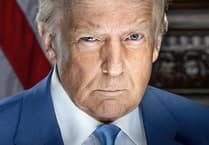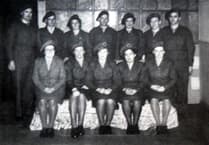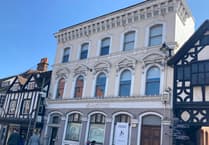David Bowie sadly passed away on January 11, 2016, aged 69, after a battle with cancer. Last month, he was awarded a posthumous Icon award at the Brits, as Lorde sang Life on Mars while former Eurythmics star Annie Lennox and actor Gary Oldman read tributes to the South London-born star, who had hit records over six decades.
The Herald’s GABRIELLE PIKE reflects on her exclusive interview with Bowie at the height of his popularity on a worldwide tour in 1983, for at top German magazine.
IN the summer of 1983, Bowie fever swept across the world, when the Serious Moonlight Tour, his largest, longest and most successful series of live shows so far in his career, took off.
Bowie opened in Brussels on May 18, and ended at the Hong Kong Coliseum on December 8, after 96 performances, which attracted crowds of more than 80,000 for a single show, selling more than 2.6 million tickets.
The tour promoted David Bowie’s latest and 15th studio album, Let’s Dance, co-produced by Chic’s Nile Rodgers, and featured hits Modern Love, China Girl, and of course the title track – the chameleon artist’s first real venture into disco music.
I had the privilege of seeing three of the concerts in different parts of the world and received an invitation for an exclusive interview with the legendary artist at the Rosemont Allstate Arena, in Chicago, half way through the tour, in August 1983.
Bowie had turned down requests by major US publications, including Life Magazine, when the call came at 2am, telling me to fly out to Chicago for an exclusive interview with the Ziggy Stardust star himself.
The interview took place on August 2, 1983, backstage in David’s dressing room, where he relaxed before the show. He was dressed casually and welcomed me with open arms. Bowie spoke about the tour, his forthcoming film Merry Christmas Mr Lawrence, his theatre performance as John Merrick in The Elephant Man, his time in Berlin, future plans and his son Duncan Jones.
After the interview David invited me to stay and join the band and crew for dinner backstage before the start of the show, which I was able to watch from the side of the stage.
David described life on the road as light-hearted and very easy going. Despite adding more dates each day, he declared, he did not feel tired or exhausted. “Not at all, it’s no problem – everyone in the whole outfit is incredibly well on cue, and that helps a lot,” he said.
“Nothing is taken desperately seriously. There are no problems at all – especially in the relationship between the band and the crew. It’s been absolutely wonderful all the way through.”
David was never keen on flying but the distances between the venues made it impossible to use any other form of transportation.
“I totally got over that and it helps to just have one craft and the same pilot taking us everywhere,” he added.
He described the stage show as very “tongue in cheek” – a light hearted affair, but making the music very good.
The new film in which Bowie played British soldier Jack Celliers who during World War Two was captured by Japanese forces and held in a prison camp by the honour-bound Captain Yanoi (Ryuichi Sakamoto), was due to be released in the UK, on August 25, that year.
“For me I found it the easiest kind of filming I had done, mainly because I was given so much freedom to interpret the character any way I wanted to,” he explained.
“It’s much harder working under the discipline of a director – especially if you don’t really agree with the way the director is taking the film. But on this all of us were given an incredible amount of freedom.
“In terms of our characters – myself, Tom Conti and Jack Thompson, who plays Group Captain Hicksley, had considerable freedom to do what we wanted to do.
“So that made it not easy so much – but more fulfilling.
“I think it’s an excellent movie. I am quite pleased with my performance – but overall the film itself is a wonderful movie. It’s not an enjoyable film – but it’s something that stays with you long after you left the cinema.
“I think the Japanese actors were terrific – especially Takeshi Kitano, a Canadian actor, who plays Sgt Gengo Hara – he is fantastic.
“He is a stand-up comedian in Japan. His performance is so incredibly sensitive – he is just tremendous.
“I enjoyed working with Tom Conti, who plays Colonel John Lawrence. He is absolutely wonderful – a very generous guy. He helped me in the way that he was not selfish with his own way of playing the part.
“I knew pretty much what I wanted to do in terms of the character, but he bounced back and forth.
“Sometimes it’s really annoying to get an actor who is very selfish about his own part and does not want to be involved in inter-relationships – but Tom was great.”
The movie was filmed on an island called Raratonga in the South Pacific – as near as possible to Fiji, where the story takes place. The unforgettable soundtrack was composed by Japanese actor and musician Ryuichi Sakamoto.
Bowie continued: “I have two or three ideas for films that are suitable – quite exciting and good scripts.
“I am reading a lot while I am on tour but there is not much I can do to set anything up while touring.
“I am pretty sure that I will do something after the tour – which I may well do in January, again as an actor.
“And then I may well do something as a director shortly after that.”
Bowie admitted that with the Serious Moonlight Tour he wanted to play live anywhere where he had not performed for five years and more, and he stressed he would only do shorter tours in the future.
“I’ll change it completely again – have to keep it interesting to look at” the Life on Mars singer said. “I can only see myself doing a short tour next year and that depends what kind of album I make after this tour.
“I did not expect the kind of success this tour is having.
“We just did not know what was going to happen when we started booking the tour. So we played it very safe and it just escalated as soon as the announcement was made.
“And it is still snowballing in the States – and now we are doing stadiums, after starting off doing indoor gigs.
“We have already played six stadiums and more are being added.
“So it has exceeded all my expectations considerably – considerably! It’s wonderful – I am not complaining!’
Bowie made a tongue-in-cheek confession: “Perhaps I’ll split up after the tour – that’s the trouble with being a solo artist – you can’t split up – you can’t go your own separate ways, like so many bands do.
“I think because I am a solo artist it gives me a lot more freedom and a lot more potential diversity to take on more interesting things.
“The possibility of more musical-oriented shows in terms of what would have been called a stage musical is far more open to me than it is for a band. It is far more difficult for a band to do anything other than to play a gig.
“That has always made it easier for me to present something more theatrical.”
Bowie admitted he had no preference between being a musician, actor or performer as long as he had the movement and freedom to go from one project to the other, often getting ideas for movies while working on music.
Going out while on tour back then was difficult for David, who loved wandering the streets, visiting art galleries and exhibitions.
“I have had problems getting out and about in America. I tried at the beginning, but it is really difficult to walk about. I did not think it would be like that – so that’s a bit disappointing. When I was here in Chicago for a long time doing Elephant Man on stage, I never had any problems. But a tour is different – the focus is different – it is always more exaggerated and people become more excited than they would normally.
“This kind of attention and publicity is teeth gritting.
“But it dies down as soon as you stop touring. It’s as though you are a different person again.
“It is really strange how people react when they see your face permanently in the media. But you are still the same person when you are not in the media every day.”
The Berlin years from 1976-79 – when he left America to get away from a drug culture that was harming his long-term health, were a significant period in the Space Oddity singer’s life and he remembered them with great fondness.
“I must admit that do feel a kind of home-sickness for Berlin,” he said. “I really do like Berlin – it is an extraordinary place – and it meant so much to me.
“It changed my ways, looking at things, being with people and doing what I wanted to do.
“In fact, I recently went back to where I used to live and had a look around. But I could not summon up the courage to knock on the door of the apartment I used to live in – I really regret that.
“I went round the back and looked to see where Iggy Pop used to live – that’s been transformed. But things haven’t changed that much – not in that particular area.
“There were some Turkish kids in the street – probably the same kids with a ball that were there when I was.”
In 1983, Bowie made his home in Switzerland and his son Duncan Jones came to visit him every weekend while he was on tour in Europe.
“He comes in and out a lot all the time. He saw most of the European tour. While we are in the States – he is coming in a little less, because it is really a long way to fly.
“In Europe it was easy. He’d come in on the Friday night after school and go back for Monday.”
Duncan was delighted with the tributes paid to his late father at last week’s Brit Awards, describing Lorde’s performance of Life on Mars as “just beautiful”.
Gabrielle caught up again with David Bowie in Sydney, Australia, in November 1983, joining Duran Duran on their Sing Blue Silver Tour around the world, and watched him perform to more than 80,000 fans at the Western Springs Stadium in Auckland, New Zealand, the biggest crowd on the whole tour.
Duran Duran were huge Bowie fans and excited at the prospect of finally meeting their idol face-to-face on the other side of the world.
The last show of the Serious Moonlight Tour at the Hong Kong Coliseum on December 8, 1983, coincided with the third anniversary of John Lennon’s death and Bowie performed his version of Imagine as a tribute to his long-time friend and former Beatle.
• Gabrielle’s interviews with Duran Duran can be found in a book by Bowie and Duran Duran tour photographer Denis O’Regan, entitled Careless Memories.





Comments
This article has no comments yet. Be the first to leave a comment.